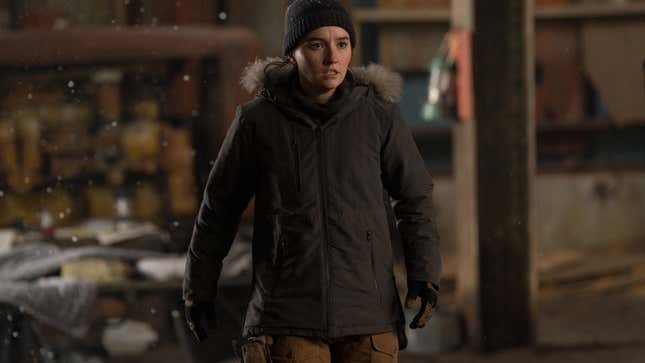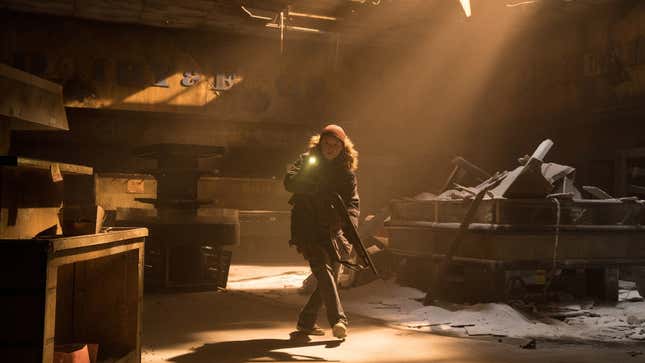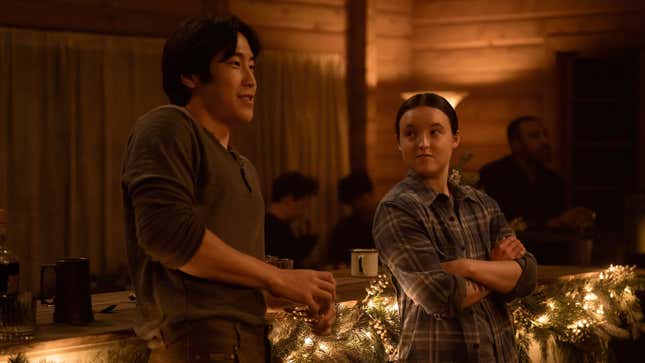In the years since The Last of Us Part II launched in 2020, I’ve noticed a fascinating phenomenon when people talk about Naughty Dog’s divisive sequel. Some people talk about Ellie’s revenge story in ways that seem incongruous with the game I experienced. Where I would call The Last of Us Part II a beautiful tragedy born of grief and ended by forgiveness, others claim that it’s a meaningless exercise in violent excess that turns a once-beloved video game icon into the unambiguous villain. Even if I don’t agree with the latter and find arguments along those lines baffling, there’s still something bold about a game being so open to that interpretation. The HBO live-action series, meanwhile, feels terrified that someone might not get it, and the result is a weirdly patronizing version of a story that once trusted its audience to follow along.
To the uninitiated viewer, The Last of Us’ second season probably won’t register as much different from the first. If you have no familiarity with the PlayStation 4 game it’s based on, it will come across as straightforward prestige television with the emotional restraint of your average daytime soap opera. The first season also did this, with entirely new scenes made to let actors basically look at the camera and describe all the nuances of morally dubious people doing what they think is right. I mostly eyerolled at scenes in season one in which Pedro Pascal as Joel joyfully told Bella Ramsey’s Ellie about how he finally got a second chance at being a father. However, season two’s constant insistence on telling you the story’s themes is so unbearable that it robs you of any chance to consider how you might feel about what’s transpiring before being told how you should.

The Last of Us Part II’s mystique is lost when characters tell each other—and, by extension, viewers—everything. Very early on in the season, for instance, the show lifts the curtain on the game’s secret second protagonist Abby, played here by Kaitlyn Dever, and her backstory. Later, she gives a villain’s monologue before she delivers a series of killing blows, just so everyone in the room is clear about why she was willing to cross several state lines in pursuit of a vendetta. It all suggests a show that wants no part of the intentional disconnect between player and protagonist that Naughty Dog built into the game.
Abby isn’t the only victim of this confounding shift in priorities. Ellie is similarly walled off from the player in Part II, with her own motives and perspective obscured until periodic flashbacks reveal why she’s in such a conflicted, violent daze. HBO is spreading Part II’s story across multiple seasons, and apparently, it was decided that viewers couldn’t sit in that discomfort for several years if people who played the game could barely stand it for 25 hours. So, instead of a faithful reflection of the game’s approach, we get a condensed, jumbled version of all these events that treats every moment of Ellie’s violent spiral like an annotated explainer on YouTube might. I’ve always found Ramsey and Pascal’s performances deeply inferior to their game counterparts, but in season two, it’s harder to tell if it’s just a problem with the material because both actors spend so much time explaining and clarifying things that the game, with its more sparse, subtext-driven script, left unsaid, making it a compelling and challenging text to unravel.
I understand the hesitance to bring a story as thorny as The Last of Us Part II to a wider audience without stripping some of those thorns away. Sure, the game has been widely lauded as an all-time great, but the revenge story it tells is still incredibly divisive, and the worst people in gaming took it so far that Laura Bailey, who portrays Abby in the game, received threats against her family’s safety. Dever had some extra security on set in case these same people tried something while the actor was shooting her scenes in season two. Much of that backlash comes from a lack of empathy for the character’s situation, but The Last of Us Part II is a story built upon people not understanding each other and living in a world where only one language speaks volumes: violence.

Overall, the show seems scared of silence. Unlike a player experiencing the game, the viewer isn’t meant to inhabit a specific viewpoint and act out the scene. As a result, it seems the show’s creators have decided that it has to lay everything bare, leaving no action, motive, or regret to the imagination, just in case you weren’t sure that everyone here is complicit in the grief-driven cycle of violence that’s being perpetuated. The Last of Us season two doesn’t just want you to feel empathy for both its heroines; it wants to make sure you understand that this is the point. You might feel no sympathy for Abby, you may think Ellie has gone too far, but that’s not for you to decide. The show already knows the lesson it has to teach, and the collateral damage is that no one talks to each other like they aren’t aware that someone is watching them.
The decision to obscure all those nuances was foundational to the story The Last of Us Part II told; meanwhile, the show removes all that ambiguity and doesn’t have much else to offer in its place. It replaces bold, divisive choices for safe ones. It ups the action, even though I found some of the larger-scale battles with an infected horde less thrilling to watch than they were to play. We spend some extra time with characters like Isaac, the leader of the militaristic Washington Liberation Front. He is once again portrayed by the excellent Jeffrey Wright, reprising his role from the game, and he has some of the most gripping scenes in the entire season, even if they fall victim to the same unnatural exposition as everything else in the show. Isabela Merced is a delight as Ellie’s new girlfriend Dina, though much of her character feels lost in translation without the extended time the game lets you spend with her in its exploration segments.

I’m being deliberately vague about the specifics of what happens in season two because I still think some episodes will be shocking if you have no idea what you’re getting into. Plus, we will have weekly recaps for each episode going up as the season airs to get into all the nitty-gritty. But my big-picture takeaway is that this season feels like the coward’s version of a story that was, for good and ill, unflinching in its commitment to let you feel however you were going to feel about it. It’s why The Last of Us Part II is divisive, but it’s also why it’s as affecting as it is to those with whom it resonates. In trying and failing to adapt the structure of the original game, The Last of Us season two feels like a cobbled-together summary. Sure, it’s probably more entertaining than reading a synopsis, but it’s certainly less thought-provoking than the source material.
Many have described The Last of Us as a “game trying to be a movie” because of its cinematic nature and linear story, but thus far, the passive version of Part II has only made it clear that it was always more than cutscenes strung together by stealthy cover shooting. The intentional distance these games put between you and Ellie, Abby, and Joel was always something only a game could accomplish. But if you’re not making a player act out a role they’re uncomfortable with, why subject a viewer to any discomfort at all? The Last of Us Part II was always more than the sum of its parts, to the point where I tell most people not to cast judgment on the game until they’ve hit credits. In translating this game into a show, HBO has robbed it of some of its most crucial elements, and I don’t expect that to change when it finally finishes telling the story of Part II. Just play the game.


